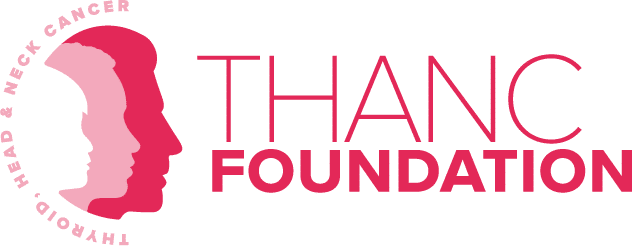
During these difficult times, it’s important to have accurate medical information on how to handle the changing COVID-19 situation. Our team of thyroid, head and neck cancer specialists at the THANC Foundation have assembled a list of the most helpful guidelines for cancer care in the context of COVID-19. We organized this advice into 3 groups: general, thyroid cancer-specific tips and head & neck cancer-specific tips. This article is not intended to provide comprehensive COVID-19 hygiene guidelines for the general public, but rather a specific set of tips for the unique patient population of thyroid, head and neck cancer patients. Please visit the CDC and WHO websites for general guidelines.
The exact transmission of COVID-19 remains unknown but the primary spread is thought to be from droplets and aerosols from an actively infected person. Not all people with COVID-19 are symptomatic. Therefore, until there are adequate processes in place to re-open society, the CDC recommends that people stay at home unless it is essential that they go out.
If it is essential to go out, then special precautions are recommended to prevent the spread of COVID-19 and to minimize your exposure. Take care to cover your mouth and nose with a cloth covering and cover your eyes with either glasses or a face shield. These recommendations also apply to patients with a tracheostomy or total laryngectomy as there is still the potential for viral load exposure to the upper airways.
- If you have upcoming medical appointments, call ahead to make sure they are still scheduled to occur. Many medical facilities are altering their normal schedules and canceling or rescheduling non-emergent appointments and procedures. Additionally, check if your doctor’s office is offering telehealth or virtual care services to communicate with healthcare professionals, so you can get the information you need without leaving your home.
- If you have an upcoming surgery or have just recently had surgery, check with your doctor’s office to plan for follow-up care, whether it be an in-person appointment or a telehealth visit. Most hospital facilities are now requiring immediate preoperative COVID-19 testing to ensure that is safe to proceed with surgery. Stay educated about wound care and ask your doctor what the most common postoperative complications are. If they can be handled without returning to the hospital, it’s best to avoid unnecessary visits to healthcare facilities as these visits may increase your chances of COVID-19 exposure.
- If you need to take certain medications routinely, stock up at your local pharmacy with a 2 months supply, if you can. If needed, call your doctor to ask for a prescription refill in light of the additional restrictions and precautions in place for COVID-19.
- Check your local health system’s guidelines and policies regarding COVID-19 and limiting its spread. For New Yorkers, check the Mount Sinai website for best practices to follow during this time. Some basic practices to limit exposure include:
- Avoid touching face and mouth
- Wash hands for 20 seconds with soap and water
- Avoid physical contact and crowded spaces
- If you must go into a public space, try to stay 6 feet away from people and if possible wear a mask and gloves
- Disinfect objects that are frequently touched such as phones, doorknobs, and tabletops
- Have a plan in place in case you get sick. Identify a caregiver and stay in touch with family, friends, neighbors, and healthcare professionals during this time via email or phone, especially if you live alone. If you are aware of an exposure or are experiencing symptoms such as a sore throat, dry cough, fever, and/or shortness of breath, seek medical help as soon as possible. Try to contact your care team over the phone before coming into a medical center.
Thyroid Cancer-Specific Tips
- Remain calm. Know that a thyroid cancer diagnosis on its own does not increase a patient’s risk of acquiring COVID-19 or developing SARS-CoV-2. Most thyroid cancer cases are safe to be deferred until after the current COVID-19 pandemic and are not considered urgent by the recent national guidelines. “Urgent” cancer cases include cancers with short doubling times, aggressive recurrences, or anaplastic thyroid cancer.
- If you currently take thyroid hormone replacement medication, continue to take your medication as prescribed. Normal thyroid hormone replacement will not negatively impact your immune system and does not put you in the higher-risk immunocompromised patient population.
- If you have stopped taking thyroid hormone replacement medication (Levothyroxine, Synthroid, etc.) for a prolonged period of time and notice any new symptoms that might be attributed to your thyroid (fatigue, cold intolerance, reduced energy levels, sleepiness, muscle weakness, etc.), you should contact your doctor’s office to see if you need to have bloodwork done. High TSH levels are a reflection of hypothyroidism (low thyroid hormone levels in the blood) which can be fatal in combination with COVID-19 due to the higher risk of developing complications like severe pneumonia and Severe Acute Respiratory Syndrome (SARS).
- If you’ve had your thyroid surgically removed and haven’t had your TSH (Thyroid Stimulating Hormone) levels measured in the past year, it is a good idea to have this bloodwork done and have it sent to your doctor to review.
- If you have thyroid cancer with pulmonary or distant metastases that has been treated with systemic therapy such as Kinase Inhibitors (e.i. Sorafenib, Lenvatinib), you may be at a higher risk of contracting COVID-19. If this is the case, get in touch with your doctor’s office to see if there are any additional precautions you need to take.
Head & Neck Cancer-Specific Tips
- Distance yourself from sick people and stay home or shelter in place if you are experiencing a fever, cough, or shortness of breath, unless your symptoms require immediate medical attention.
- If you have a tracheostomy or total laryngectomy, the CDC states the most effective way to protect yourself against COVID-19 is to wash your hands frequently with soap and water for 20 seconds before touching your eyes, nose, and mouth. Take extra precautions before handling your stoma or heat moisture exchanger (HME) by wearing gloves in addition to washing your hands frequently. Cover your stoma during all coughs with a tissue and wash your hands after all expectorations. Take care to frequently clean and disinfect frequently touched objects and surfaces that are used in stoma care, such as mirrors and countertops. We recommend that you use your non-dominant hand for manipulation of your stoma and use of TEP and use your dominant hand for contact with items in the environment (i.e. door knobs, phones) to protect transmission to you from these objects.
- Laryngectomee patients should wear an HME at all times to allow for filtering of microparticles that may be breathed in, especially when around other people. Ideally, HMEs should be worn with a baseplate (versus a laryngectomy tube) that will force air through the HME to minimize aerosolization. If possible, try to replace your HME after community exposure (i.e. grocery store, pharmacy, doctor visit). In addition, if you can, wear a hands-free HME to eliminate additional touching during speech production if you use a tracheoesophageal voice prosthesis. InHealth Technologies and ATOS Medical make HME cassettes that have viral/bacterial filtration of inspired air. Atos Provox Micron HME filters virus and bacterial particles and provides two-way filtration. However, not all patients can afford HME supplies; thus we recommend that all laryngectomee patients cover their stoma with a face mask, turtleneck, bandana, or scarf for an added layer of filtration of inspired air. Additionally, you should consider self-isolating, if it is a possibility, to both minimize your risk of COVID-19 infection and to protect others in the event that you are exposed to COVID-19.
- If you have a tracheoesophageal voice prosthesis (TEP) and are experiencing leakage, it may be difficult to visit your clinician to manage the leakage due to the current COVID-19 situation. If you have a plug, insert the plug as needed while eating and drinking. If you do not have a plug, you can try eating and drinking at the same time to minimize leakage. Alternatively, you can try drinking thicker fluids such as nectars or tomato juice or adding a thickening agent to any thin liquid. You can also try to take smaller sips of thin liquids to minimize the leakage or try rotating the TEP voice prosthesis. If none of these options work and the leakage is profuse to the point that you are unable to swallow any liquids without excessive leakage, you can place a cotton tipped applicator on the open end of the TEP voice prosthesis while you’re drinking to minimize leakage and prevent aspiration. You should contact your speech therapist for further guidance.
- If you have undergone or are currently undergoing chemotherapy, it is important to practice self-isolation. Chemotherapy-induced immunosuppression makes patients more at risk of severe complications if they contract COVID-19. If you do not have any COVID-19 exposure history and have not developed any new symptoms, your medical oncologist will determine if and when chemotherapy treatment will be administered.
It’s important to stay educated and up-to-date on the changing coronavirus situation. Local, state, and federal governments are putting new precautions in place each day. Check resources like the CDC and WHO websites and frequently to see an updated list of affected areas and preventative measures to take to avoid contracting and spreading COVID-19.


